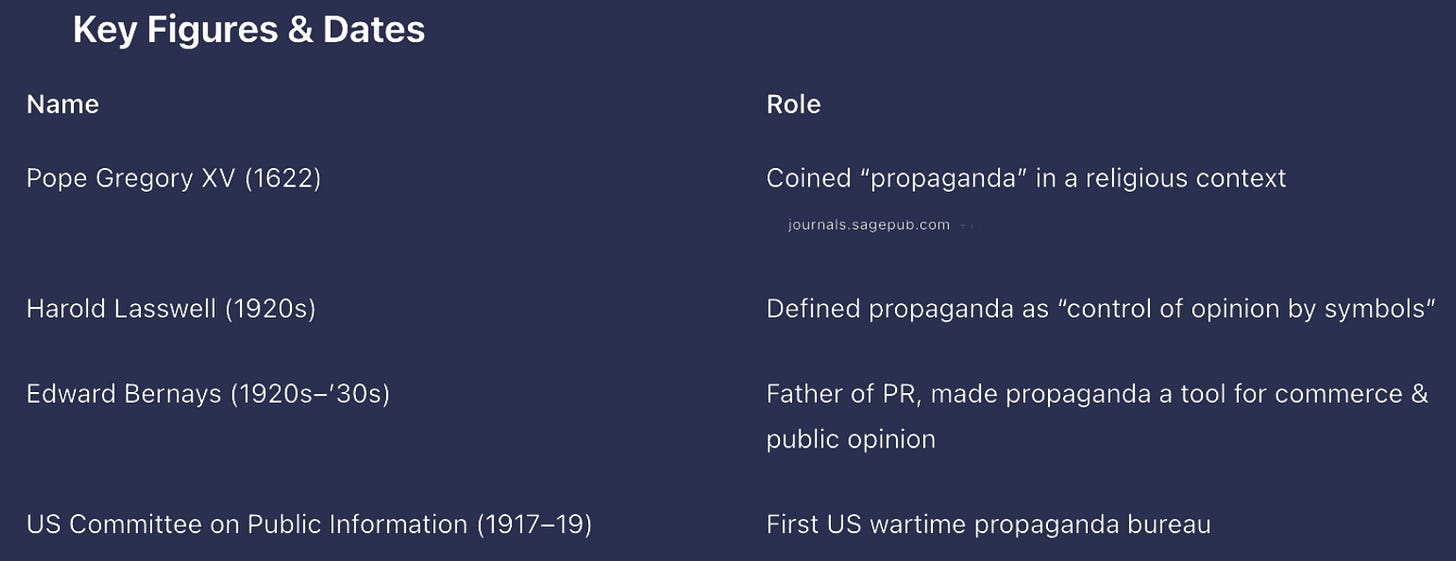🔹 What Is It?
Propaganda is the deliberate use of information—facts, rumors, half-truths, or lies—to influence public opinion or behavior britannica.com+1verywellmind.com+1.
It differs from casual communication by being purposeful and manipulative sciencedirect.com+3britannica.com+3en.wikipedia.org+3.
🔹 When & How Did It Begin?
Propaganda dates back thousands of years—ancient Persia, Rome and beyond used symbols and inscriptions to shape beliefs .
The word “propaganda” originated in 1622 when Pope Gregory XV formed the Congregatio de Propaganda Fide to spread Catholicism journals.sagepub.com+1historians.org+1.
With the printing press in the 1500s–1600s, rulers like Napoleon and Maximilian I began widespread use of printed materials to influence public views en.wikipedia.org+4en.wikipedia.org+4files.eric.ed.gov+4.
🔹 Why Did It Start?
To unite or control populations, especially during war or political upheaval.
Example: In World War I, governments (Britain, the US, Germany) used mass posters, films, and then the US’s Committee on Public Information to build support and demonize enemies en.wikipedia.org.
🔹 What Does It Do?
Uses emotional symbols, slogans, and repetition to produce quick, emotional responses.
Employs psychological tricks—name-calling, fear, bandwagon effect—to manipulate attitudes and behavior verywellmind.com
Creates simplified stories of heroes vs. villains and targets specific groups.
🔹 Why Is It Dangerous?
Overrides critical thinking—pushes emotions over logic theguardian.com+10verywellmind.com+10wired.com+10.
Can justify atrocities when combined with censorship and demonization (e.g., Nazi Germany, Stalin’s USSR)
Can undermine democracy, polarize societies, and enable hate speech or violence
🔹 How Did It Escalate?
Advent of radio, TV, and especially internet/social media, made propaganda faster, cheaper, and more viral en.wikipedia.org+1en.wikipedia.org+1
Bots, algorithms, deepfakes amplify misinformation, sometimes from governments, corporations, or extremists
Example: Russian online interference in 2016 used hundreds of memes to spread division and confusion newyorker.com+1newyorker.com+1
🔹 Who Do We Believe? Why?
We trust what matches our identity or aligns with our existing beliefs.
Familiar sources, catchy messages, or emotional appeals feel trustworthy—even when facts are skewed.
Propaganda is most effective when we’re not aware it’s happening.
✅ How to Spot It
Charges emotion first, facts later (or not at all).
Reduces complex issues to simple heroes vs. villains.
Repeats phrases or slogans everywhere.
Relies more on story than evidence.
🧠 Final Fact:
Propaganda is powerful—but only if we don’t question it. When we verify, ask for evidence, and check multiple sources, it loses its impact.





